|
|
|
Sort Order |
|
|
|
Items / Page
|
|
|
|
|
|
|
| Srl | Item |
| 1 |
ID:
160057
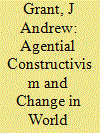

|
|
|
|
|
| Summary/Abstract |
Like Alice, speaking out loud as she seeks to figure out the jarring changes in her physical stature and make sense of her new environment in Lewis Carroll's classic literary work Alice's Adventures in Wonderland, so too are international relations (IR) scholars and observers trying to comprehend recent and ongoing changes in the global political order. I concur with Paul (2017, 2) that we are living in “a time of major changes in world politics. These are driven by, among other things, the rise of new powers, deepened economic globalization, and the emergence of violent transnational forces.”
|
|
|
|
|
|
|
|
|
|
|
|
|
|
|
|
| 2 |
ID:
160048
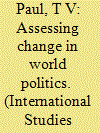

|
|
|
|
|
| Summary/Abstract |
This introductory paper of the presidential issue examines IR theory's problems and prospects in understanding when and how change happens, especially peaceful transformations in world politics. The ISA 2017 Baltimore conference was aimed at taking an assessment of our understanding of change, its different manifestations as well as implications. The papers in this special issue deal with important questions on different markers and manifestations of change in world politics. The implications might range from epochal transformations to limited changes in the international system, especially within and between regions to incremental changes in how international treaties and global governance initiatives are promulgated, which in turn produce long-term and/or short-term changes in the architecture of world politics. It also addresses the following questions: How do different IR paradigms address change? What are their strengths and weaknesses? Can we understand change sequentially or cumulatively or combining their insights? How do material and ideational factors link together in generating change?
|
|
|
|
|
|
|
|
|
|
|
|
|
|
|
|
| 3 |
ID:
160050
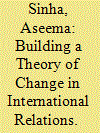

|
|
|
|
|
| Summary/Abstract |
Fundamental transformations in the distribution of power among nations have re-focused the attention of the International Relations (IR) subfield on how to understand change and power transitions. I add to this larger literature by presenting a typology of change drawn from comparative politics that incorporates attention to incremental or slow moving change, and path-dependence as a theoretical tool to explain discontinuous change such as wars, and the fall of the former Soviet Union. I offer a distinction between process of change and its outcome. Change may be incremental or disruptive and could lead to continuity with existing institutions or their transformation. This typology allows us to explore the process of change and develop theories of change in a new way. In essence, I argue for broadening our conceptions of change to account for endogenous sources of change (internal to the system), and incremental yet significant change.
|
|
|
|
|
|
|
|
|
|
|
|
|
|
|
|
| 4 |
ID:
160049
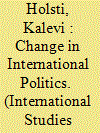

|
|
|
|
|
| Summary/Abstract |
This essay notes the major changes in actors, institutions, and processes of international politics over the last four centuries. It emphasizes wars, revolutions, and the dreams of major historical figures such as Nepoleon and Hitler as the major sources of change. Important legacies of these changes include norms that have de-legitimized territorial conquest and organizations committed to the peaceful resolution of international conflicts.
|
|
|
|
|
|
|
|
|
|
|
|
|
|
|
|
| 5 |
ID:
160052
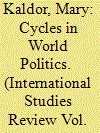

|
|
|
|
|
| Summary/Abstract |
This article argues that we are living through a period when political institutions are out of step with dramatic, economic and social changes. In similar periods in the past, war has often played a key restructuring role. But contemporary wars are much less likely to achieve this. The main agents of change are social movements and new forms of communication. The article concludes that we need new forms of global governance and some critical rethinking of academic discipline.
|
|
|
|
|
|
|
|
|
|
|
|
|
|
|
|
| 6 |
ID:
160055


|
|
|
|
|
| Summary/Abstract |
Since the end of Cold War, three sets of actors have produced change in global governance, change that could be threatening and transformative for existing global governance institutions and the future of international cooperation. Three alternative futures have emerged: fragmentation, stagnation, and transformation. Emerging powers—and some established powers—have promoted new regional institutions that offer useful competition but also the threat of fragmentation. Divergence of preferences between emerging and incumbent powers have also produced stagnation, but the greatest threat of stagnation has come with the rise of populist and nationalist movements that have now found a voice in two powerful countries, the U.S. and the U.K. Finally, non-state and subnational actors have produced new modes of governance, in which national governments and intergovernmental organizations play a reduced, though often strategic role. United States withdrawal from or disruption of global governance would alter the likelihood that these futures will emerge.
|
|
|
|
|
|
|
|
|
|
|
|
|
|
|
|
| 7 |
ID:
160051
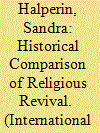

|
|
|
|
|
| Summary/Abstract |
Predictions about the future of the Middle East have proliferated in step with recent events and escalating tensions in the region. This paper highlights the usefulness of historical comparative research for addressing predictive questions and, specifically, those relating to the current Islamic revival. It challenges assumptions that have prevented researchers from exploring this avenue of research; and describes a generally overlooked chapter in modern European history: Europe's nineteenth century revival of militant, literal, religion, and the region-wide, battle it unleashed between religious and secular forces through the region. It then highlights similarities, both in the nature of revivals in Europe and the Middle East and of the socio-economic structures which sustained them. Finally, it suggests how and why the battle between religious and secular forces in Europe came to an end. While, it does not offer predictions for the Middle East, it suggests how comparative insights might contribute to producing better ones.
|
|
|
|
|
|
|
|
|
|
|
|
|
|
|
|
| 8 |
ID:
160060
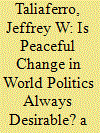

|
|
|
|
|
| Summary/Abstract |
An assumption runs through this symposium that peaceful change is desirable and ought to be encouraged. We do not believe it is that simple. The term “peaceful change” itself is not well defined. The article, therefore, narrowly defines peaceful change as a process whereby a hegemon voluntarily cedes its dominant geopolitical role to a challenger in one or more regions. Drawing on neoclassical realism, we hypothesize that a declining hegemon will only accept peaceful change if: (1) it has high confidence change is inevitable because it lacks the military, economic, or political means to resist it; or (2) when domestic political or economic costs of resistance of prohibitively high; or (3) when the leadership of the hegemonic state faces domestic constraints in its ability to enact policies to resist the challenger.
|
|
|
|
|
|
|
|
|
|
|
|
|
|
|
|
| 9 |
ID:
160063


|
|
|
|
|
| Summary/Abstract |
What is the global future of liberal internationalism (LI)? LI is an interlocking set of national and international institutions designed to maximize individual autonomy through peaceful commerce and self-government. Its future depends on the presence of a liberal hegemon, not only to provide global public goods but to promote liberal democracy by action and example. Hegemons are important to the international spread and contraction of a given regime type. They actively promote their institutions and weaken alternatives, and their successes (failures) inspire imitation (avoidance) in other countries. The future of liberalism was in doubt in the 1930s, but liberal states ended up defeating fascist and later communist ones, and the United States established the current LI system that went global after 1989. Today liberalism's superiority again is in doubt: The continuing rise of market-Leninist China interacts with a new diffidence in the United States to challenge the appeal of liberal democracy and hence LI. China appears to seek an internationalism that is less liberal. The future of LI will turn on how well the United States and other democracies, on the one hand, and China, on the other, respond to the relentless drives toward open economies and automation.
|
|
|
|
|
|
|
|
|
|
|
|
|
|
|
|
| 10 |
ID:
160056
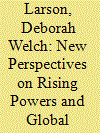

|
|
|
|
|
| Summary/Abstract |
Research on rising powers has made advances in studying new actors, broader questions, conceptualization, and models of world order. Instead of the previous focus on a hegemon and rising power in the power transition literature, scholars are focusing on major and middle powers such as India, Brazil, and Turkey. Instead of a narrow concern with prospects for hegemonic war, researchers are examining the effects of rising powers on global governance and world order. Some scholars argue that rising powers are not trying to overturn the international order, but to establish a parallel order within it. Advances have also been made in conceptualization, such as the important concept of accommodation, transcending the earlier narrow concern with territorial accommodation or appeasement. More work has been done on the concept of clubs such as the BRICS and the G20. Finally, scholars are identifying new, more pluralistic patterns of world order, in which countries specialize in various tasks.
|
|
|
|
|
|
|
|
|
|
|
|
|
|
|
|
| 11 |
ID:
160054
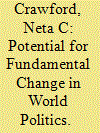

|
|
|
|
|
| Summary/Abstract |
Despite the Realist’s assertion that nothing fundamental changes in world politics, change is the norm in all life and all fields. World politics is no exception. Yes, there are continuities in world politics; they are the persistent, albeit themselves changing, mechanisms that foster fundamental change, the both large and small alterations in the nature of agents, structures, processes, and the content of arguments. Sometimes things change slowly, they evolve. And sometimes radical changes occur in a relatively short period of time; we might think of the latter as phase changes or radical ruptures at tipping points. But often those ruptures have been preceded by decades of slower work by advocates of change toiling in civil societies or specialized communities. Thus, a great deal of effort goes into not only making change but also resisting change.
|
|
|
|
|
|
|
|
|
|
|
|
|
|
|
|
| 12 |
ID:
160064
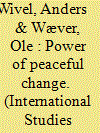

|
|
|
|
|
| Summary/Abstract |
The European Union is typically perceived by its proponents as an avant-garde, anti–power politics polity capable of civilizing its own political space and its geopolitical neighborhood (see Manners 2002; Kaldor et al. 2016). For the past decade, this conventional European narrative has been challenged by a series of events and developments amounting to an allegedly existential crisis of the EU. We unpack the nature of the current crisis and identify three long-term developments within the EU. In order to understand the crisis and its potential consequences for peaceful change in Europe, we use two analytical prisms to explore how and why the EU is, at the same time, a successful example of international peaceful change—even peaceful transformation—in international affairs and plagued by existential crisis. The first prism is realist and explains European integration and its development in terms of the interests of the most powerful states. The second prism is identity constructivist and explains European integration in terms of identity articulations. We do not seek to subsume one of these positions to the other in a theoretical synthesis, nor do we aim for analytical eclecticism—letting each theory do what it is supposed to do best (e.g., leaving the explanation of peaceful change to the constructivists and the explanation of crisis to the realists).
|
|
|
|
|
|
|
|
|
|
|
|
|
|
|
|
| 13 |
ID:
160062
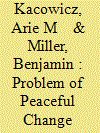

|
|
|
|
|
| Summary/Abstract |
In this paper, we examine the perennial problem of peaceful change (how to bring about a change in the status quo by means other than war?) by reflecting on the post-Cold War order from 1991 to 2017. We examine the problem at three different levels of analysis: systemic (great power interactions), interactive (peaceful territorial change), and domestic (democratization efforts). At the interactive level, we assess the record of successes and failures of peaceful territorial changes since 1991 to the present. At the systemic level, we assess the inherent difficulties embedded in systemic peaceful change (the decline of the US hegemony, the rise of China, the revival of Russia?). At the domestic level, we focus upon democratization efforts. In this context, we particularly emphasize the contours of the emerging illiberal international order in keeping peace and the status quo, bringing war, or facilitating the possibility of peaceful change. Finally, we suggest possible links between domestic, interactive, and systemic peaceful change, and suggest an agenda for future research.
|
|
|
|
|
|
|
|
|
|
|
|
|
|
|
|
| 14 |
ID:
160058


|
|
|
|
|
| Summary/Abstract |
This article discusses the changing attitudes of African states towards the governance of their mining sectors, with states seeking to assert their sovereignty through a greater agency in their mineral resources. These attitudes are strongly echoed by regional governance norms such as the Africa Mining Vision an initiative led by the African Union since 2009. I suggest that the main drivers of these changes are collective agents that transcend the realm of the state. Building on Tom Long's tripartite categorization of small state power (“derivative power”, “particular-intrinsic power”, and “collective power”) to the analysis, I highlight Africa's current mining reforms as the outcome of a collective power to shape its mining sector vis-á-vis global structures. The article discusses these changes primarily through IR scholarship on the ‘Rise of the Rest’ and on small states agency.
|
|
|
|
|
|
|
|
|
|
|
|
|
|
|
|
| 15 |
ID:
160053


|
|
|
|
|
| Summary/Abstract |
The global spread of a machine-based civilization based on accelerating scientific discovery and technological innovation has increased the rate, magnitude, complexity, novelty, and disruptiveness of change in human affairs, visible in violence, environment and information domains. Human capacity to forecast, assess and explain remains limited, and institutional capacities to adjust are inadequate. IR theory has not focused enough attention on analyzing human-material interactions. Some practical insight may be gained from renewed and broadened historical materialism, or neoclassical geopolitics, examining fit and misfit between material forces and social practices, structures and identities. Architectonic metaphors such as global village and spaceship Earth are deficient, and an alternative of a global debris mat on a narrowing river-of-no-return better captures the overall planetary situation.
|
|
|
|
|
|
|
|
|
|
|
|
|
|
|
|
| 16 |
ID:
160061


|
|
|
|
|
| Summary/Abstract |
Although a general task of social science is to measure and predict change, international relations (IR) paradigms and theories have been unable to keep up with the rapid pace and destabilizing effects of change in international politics. When addressing Russia, IR's “change problem” becomes clearer: the world's largest country is treated as an object struggling to adjust to changes rather than a protagonist introducing them into the system. Yet, twice within the last quarter century, Russia has acted as a catalyst for changes in international politics that few saw coming and which confounded IR paradigms. The Soviet leadership's decision to withdraw from the Cold War standoff and dismantle its empire in Eastern Europe was one of the most surprising events of the twentieth century. Russia's interventions in Ukraine, Syria, and the 2016 US presidential elections have similarly caught most observers by surprise. IR theories have struggled to account for these actions and have not been able to integrate Soviet/Russian behavior into their larger understanding of change in international politics.
|
|
|
|
|
|
|
|
|
|
|
|
|
|
|
|
| 17 |
ID:
160059
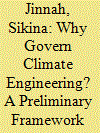

|
|
|
|
|
| Summary/Abstract |
Despite the important risks, uncertainties, and potentials surrounding emerging climate engineering technologies, governance of these technologies is lacking. This article asks: how can rationales underlying governance demand for climate engineering technologies inform strategies for governance design? It posits that demand rationales can be coupled with broad insights from theories of global governance to initiate governance proposals and discussions surrounding these emerging technologies. It proposes a preliminary framework that considers how the constellation of functional, strategic, and normative demand rationales for climate engineering technologies can inform the appropriate control mechanisms and degree of polycentricity in governance design.
|
|
|
|
|
|
|
|
|
|
|
|
|
|
|
|
|
|
|
|
|